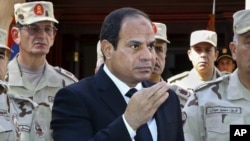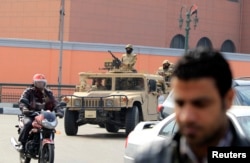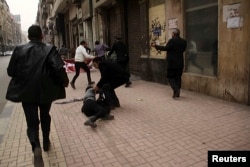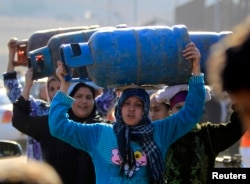A crackdown on protests in Egypt is not expected to provoke widespread unrest that threatens President Abdel Fattah el-Sissi's rule, as most Egyptians crave an end to years of political turmoil that have hammered their hopes of prosperity.
More than 25 people were killed at the weekend when security forces quelled protesters angered by what many perceive as a police state and a disregard for free speech and human rights, as well as the government's crushing of the Muslim Brotherhood.
But the unrest is unlikely to escalate dramatically as most Egyptians back Sissi's efforts to stabilize a nation roiled by upheaval since the toppling of Hosni Mubarak in 2011, say diplomats and analysts.
Sissi's long-term political survival may hinge instead on his efforts to stimulate the economy and create jobs in the Arab world's most populous country, where the unemployment rate has climbed from 8.9 percent to 13 percent since Mubarak's rule.
But the tactics used to put down the protests on the anniversary of the 2011 uprising on Sunday - with witnesses saying police opened fire with birdshot and live rounds - reminded some Egyptians of the decades of Mubarak's iron-fisted rule.
The diplomats and analysts warned that Sissi could not be complacent about public anger over any authoritarianism.
They say the dynamics of the unrest could change if Sissi does not reform the police, accused of widespread human rights abuses in a clampdown launched after the overthrow of President Mohamed Morsi of the Muslim Brotherhood in 2013.
"There are significant pockets of resistance and resentment and the alienation of those pockets is likely to increase as the regime consolidates," said Egypt expert Nathan Brown, a professor at George Washington University in the United States.
Brown said "out of control" security forces acting with impunity and apparent lack of oversight are a liability for Sissi: "If that is not corrected, [it] may lead to a return to the general resentment that moves outside of those pockets."
One of those pockets is Matariya, a rundown Cairo suburb where 18 people were killed on Sunday. Profanities condemning Sissi are scrawled on buildings in the Brotherhood stronghold.
There is also graffiti in support of the outlawed Brotherhood.
In a neighborhood of rough roads and unfinished buildings, women sat outside a mosque waiting for male neighbors to return from the burial of 20-year-old Sayeed Said Halim.
Residents said he was killed in crossfire during clashes between Islamist demonstrators and security forces. Authorities, blaming the Brotherhood for the violence, said protesters were armed. "The protests will continue until we get our rights," said Oum Ahmed, an honorific used in the Middle East.
'Egypt is exhausted'
Although Sunday's protests were the bloodiest since Sissi took office in June, key differences from the situation in 2011 allowed security forces to move decisively against activists in Cairo, Alexandria and smaller cities in the Nile Delta and the south.
During the 2011 revolt, soldiers stood by as Egyptians protested because Mubarak had alienated the military. There are no indications that Sissi is losing the support of the generals.
Also in favor of Sissi is support from Western powers who pump billions of dollars in aid into Egypt every year despite accusations of widespread abuse from human rights groups.
While they call for democratic reforms, Egypt's Western allies have taken no tough measures to promote change. Sissi says he is fighting a war against terrorism, an argument which has resonance among Western states alarmed by the rise of Islamic State militants.
"The protests are not a threat to Sissi's rule but they show there is still discontent in the country and that has to be addressed," a senior Western diplomat said.
Critics say Sissi has returned authoritarian rule to Egypt while those around him defend police tactics and say that the alternative could result in unrest and chaos.
The fatal shooting of activist Shaimaa Sabbagh at a protest in downtown Cairo on Saturday caused outcry amongst pro-democracy activists. Images of blood dripping from her face quickly spread on social media.
"They want the country like under Mubarak. Rotten and silent, without any talk," said her friend Yehia el-Gaafry.
Authorities said her death was under investigation. But police show no signs of softening. Armed with automatic weapons, they have been standing guard all week near the spot where she was shot in the back.
"The security sector in Egypt, specifically the police in its current shape and form, is a huge burden on any attempt, democratic or not, to move this country forward," said Karim Ennarah, of the Egyptian Initiative for Personal Rights.
But in downtown Cairo, where rare protests were held in the run-up to the anniversary, conversations with shopkeepers suggest Egyptians will continue to overlook reported human rights abuses, as long as Sissi delivers stability.
Other than their allies, few people expressed concern over the deaths of Islamists at the hands of security forces.
"The country is exhausted," said Hamdeya Hussein, 64, who works at a stationery shop. She said she hopes the thousands of Islamists in jail will die there. "The security forces need to be tougher so that they finish them."
Mega-projects
Sissi's initial reforms focused not on the security sector, but on rebuilding Egypt's economy. He cut politically-sensitive fuel subsidies, winning praise from foreign investors - many of who have shunned Egypt, along with tourists, due to the political and social unrest since Mubarak was ousted.
Even though the move was unpopular at home, particularly among the rural poor, there was no serious political backlash.
Sissi's long-term political survival may hinge on mega-projects designed to boost the economy and create jobs.
They include a second Suez Canal in the spirit of the ambitious national programs of late President Gamal Abdel Nasser, who was regarded as a hero by many Egyptians.
Much will also depend on whether oil-rich Gulf Arab states such as Saudi Arabia and the United Arab Emirates who see the Brotherhood as an existential threat will remain staunch financial backers of Sissi despite dramatically lower oil prices.
"The most significant risk is a steep decline in [Gulf] assistance if low oil prices persist before Egypt enacts serious reform and attracts serious international foreign direct investment," said Florence Eid, of think-tank Arabia Monitor.
A source familiar with government thinking in the United Arab Emirates said support from Abu Dhabi for Sissi and his policies will be "unwavering".
Egypt's senior security officials do not seem too concerned by the recent protests, which were followed by a series of bombs targeting police.
Police Brigadier Gamal Mukhtar told a news conference the Brotherhood had failed to muster support for the demonstrations, and described the bombs as the "last kicks of a dying horse".
Egypt is far calmer than a year ago, when Brotherhood protests hammered tourism, a pillar of the economy.
But if resentment about heavy-handed police tactics spreads, police are likely to take even tougher measures that could undermine Sissi's efforts to rescue the economy, analysts say.
"Even if there are no attacks in tourist areas and they are safe, the political protests and violence make headlines," said Angus Blair, chairman of Signet Institute, a think-tank.
"And there is then a perception created that might dissuade some tourists and investors from coming to, or investing in, Egypt."








